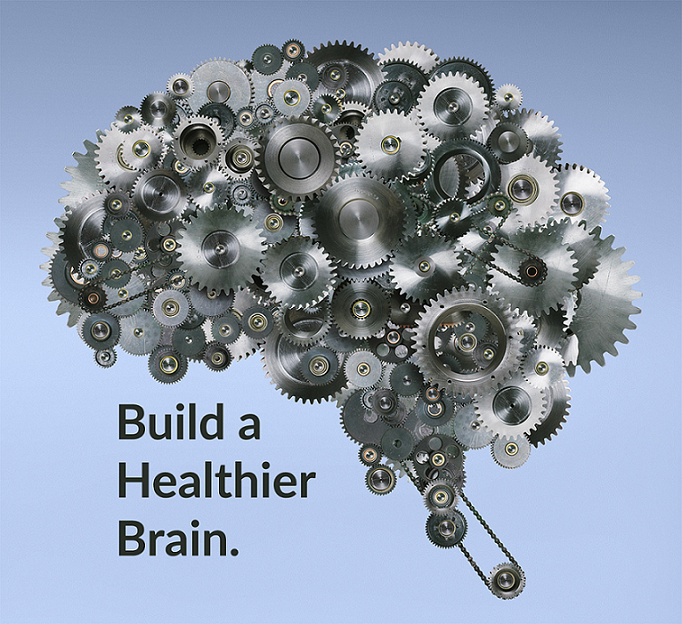Build a Healthier Brain

Improve your thinking, mood, memory, and more with this scientifically proven four-point plan.
By Marnie Schwartz for Shape Magazine
Your brain weighs about three pounds but is arguably the most important part of your body. It’s responsible for all the things that make you you: your thoughts, memories, and emotions. Previously, scientists believed that once we reached adulthood, our brains couldn’t change. But “we now know that our brains can continue to grow throughout life and that our habits and choices can shape that process,” says Allan J. Hamilton, M.D., a neurosurgery professor at the University of Arizona and a coauthor of the new edition of Younger Next Year. Here’s how to boost and strengthen yours.
STAY CONNECTED
“The brain is a social organ,” Dr. Hamilton says. In a study from the Massachusetts Institute of Technology, when participants who were completely isolated for a period of time were shown pictures of people interacting, there was activity in their substantia nigra, a part of the brain that has been linked with hunger. “This suggests that our brains are very sensitive to the experience of being alone and that social contact is a basic need,” says study author Livia Tomova, Ph.D.
“Tons of hormones and peptides are released with human contact,” Dr. Hamilton says. When we’re deprived of that interaction, inflammatory markers rise and brain hormones and neurotransmitters can diminish and well-being can deteriorate, he says.
To connect with loved ones during the pandemic, Dr. Hamilton recommends scheduling regular video calls rather than texting. Seeing a face and hearing a voice triggers your brain to release feel-good hormones, he says.
EXERCISE FIVE DAYS A WEEK
A regular workout habit can activate stem cells that were dormant, encouraging neural growth, new connections, and increased brain volume, Dr. Hamilton says. When researchers measured people’s levels of physical activity for a week and then scanned their brains, they found that higher levels of moderate to vigorous activity were associated with increased cortical thickness (a measure associated with brain health and cognition) in certain brain regions.
When kept up, this may help prevent cognitive decline, reports a recent study in the journal Medicine & Science in Sports & Exercise. Being active promotes the release of proteins called neurotropic factors, says study author Ryan Stanley Falck, Ph.D. This, in turn, “stimulates the creation of new brain cells and blood vessels in the brain, which helps maintain its structure and function.”
Scientists don’t know why, but aerobic exercise seems to boost cognitive abilities, especially decision-making, while strength training improves memory and recall. Dr. Hamilton advises doing aerobics three times a week and strength training twice weekly.
FUEL UP WITH BRAIN FOODS
A diet that’s good for your body, especially your heart, is also good for your brain, experts say. But a few foods and nutrients may give it extra power. “For your brain to work the way it’s supposed to, it has to have enormous stores of good fats,” Dr. Hamilton says. Omega-3 fatty acids, particularly DHA, found in wild-caught fish and seafood is a key part of brain cell membranes and is necessary to grow new brain cells and connections. Plant-based fats like olive oil, avocados, and nuts are also beneficial. Research has found that eating one to two ounces of walnuts a day may boost your brain and protect it from declining as you get older.
Consuming fruits and vegetables can also keep your brain healthy and happy. An analysis published in the British Journal of Nutrition found that the more fruits and vegetables people eat, the lower their risk of depression, which may be because produce is loaded with antioxidants as well as vitamins necessary to make neurotransmitters. One of the smartest things you can do: Follow a Mediterranean diet, which is full of plant foods and fish and has been shown to benefit your brain and keep it healthy throughout life.
CHALLENGE YOURSELF
“The brain loves to be pushed,” Dr. Hamilton says. So, while working on crosswords might be fun, what your brain is actually after is the tough stuff.
For instance, learning a new language may help it grow, particularly in areas that involve flexible thinking, attention, and memory, one study found.
Consider piano lessons: People who played an instrument in midlife generally did better on cognitive ability tests in their later years than non-musicians, according to other research. Playing music may make your brain more efficient, building up a reserve, so that it’s able to stay nimble even in the face of age-related changes, says study author Sebastian Walsh, a researcher at the University of Cambridge. These activities, as well as having an intellectually demanding job, stimulate the release of neurotropic factors, and push the brain to maximize its ability to form new connections, adapt, and change, Dr. Hamilton says.





